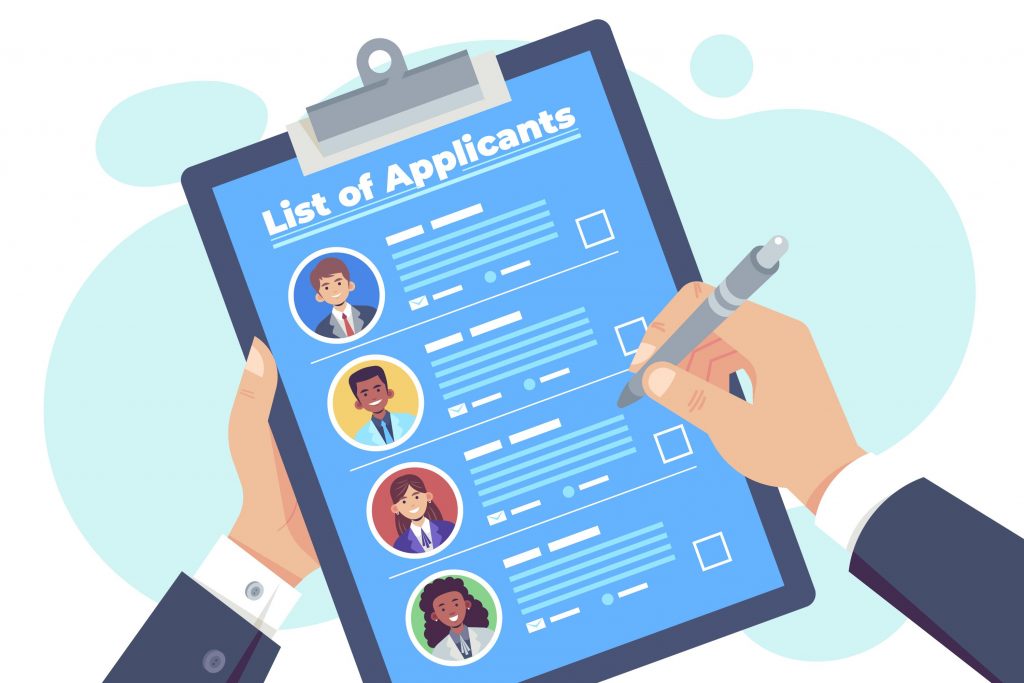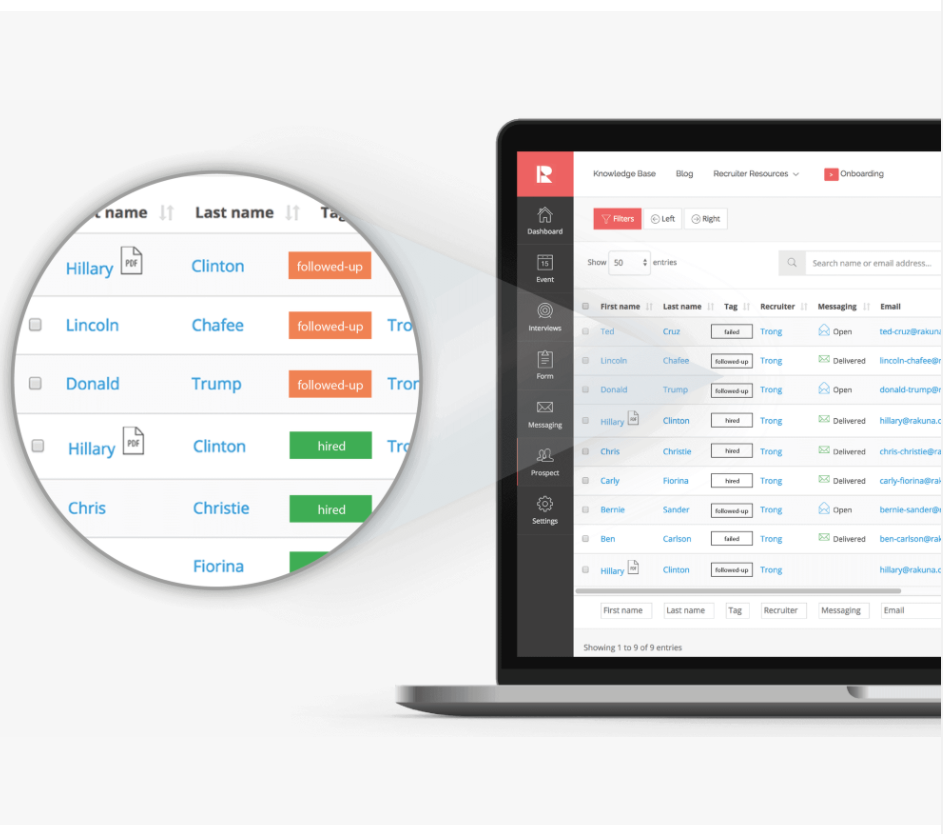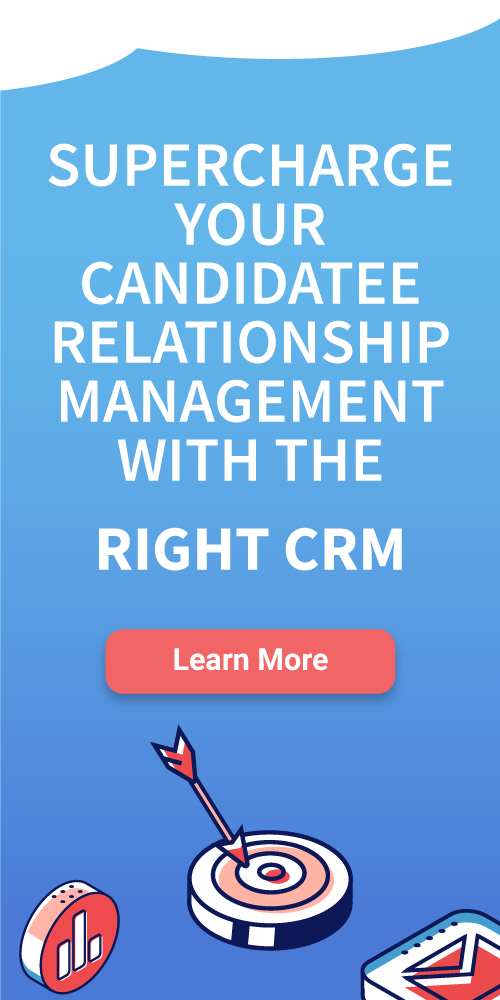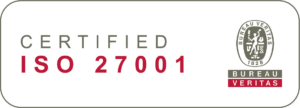To say every business can utilize some candidate relationship management software is not an overstatement. This is precisely why CRM solutions for HR exist—for hiring managers and their recruiting teams to bring quality into each recruiting campaign, no matter the industry or job type.
Whether you are a recruiter for a staffing firm or a hiring manager working with an in-house hiring team engaging in campus hiring, here are some of the most common use cases for CRM in recruiting!
The Most Common Use Cases for a Recruiting CRM
CRM and Campus Recruiting

In campus recruiting, delivering a personalized and engaging candidate experience is paramount. Recruiting Customer Relationship Management (CRM) systems have become essential tools for recruiters aiming to connect with students effectively. By facilitating early engagement and providing comprehensive visibility into the candidate pipeline, recruiting CRMs enhance tracking and automate branded communications.
Personalized Communication
Recruiting CRMs aggregate diverse candidate information, including contact details, interaction histories, and lead sources. This data enables recruiters to craft customized marketing campaigns tailored to specific criteria such as geographic location, educational institution, academic background, and personal interests. By moving beyond generic outreach, recruiters can design initiatives that resonate deeply with candidates, fostering stronger connections.
Enhanced Marketing Efforts
The pervasive use of smartphones and social media among Generation Z has transformed recruitment marketing strategies. A recruiting CRM serves as a centralized platform for managing multimedia campaigns across various channels, including emails, social media, and text messages. Advanced CRMs can analyze and compile candidate profiles, building an extensive database to support targeted recruiting efforts. This approach ensures that recruitment messages are delivered through the most effective mediums, increasing engagement and reach.
Gaining Valuable Information from Events
Career fairs and campus events are integral to university recruiting strategies. Recruiting CRMs equipped with event management features enable hiring teams to maximize these opportunities by capturing attendee data and identifying potential leads. Integrating event management tools with a recruiting CRM allows for the analysis of attendee interactions, highlighting individuals’ skills, interests, and engagement levels. Post-event, recruiters can utilize the CRM to conduct branded SMS or email campaigns, maintaining engagement by inviting candidates to future events or presenting tailored job openings.
Case Study: L’Oréal’s Campus Recruitment Strategy
L’Oréal, a global leader in the cosmetics industry, sought to enhance its recruitment process by attracting young talent from universities and schools. To achieve this, L’Oréal implemented Avature CRM, a comprehensive solution designed to manage and streamline their recruitment efforts.
Challenges:
-
Visibility into Career Opportunities: Internal surveys revealed that 50% of employees desired more transparency regarding career opportunities within the organization.
-
Retention of Young Talent: A significant number of employees sought internal mobility within three years, indicating a need for better engagement strategies.
Solution:
L’Oréal collaborated with Avature to develop the Positions Open Portal (POP), an internal mobility platform launched across 70 countries. This portal empowered employees by providing:
-
Access to Internal Job Postings: Employees could view and apply for internal positions, enhancing transparency and career development opportunities.
-
Personalized Notifications: Users received alerts for vacancies aligning with their professional goals.
-
Referral Capabilities: Employees could share postings with colleagues and refer external candidates, leveraging their networks to attract top talent.
Results:
-
Increased Internal Mobility: 75% of positions posted on L’Oréal’s career site were filled by internal candidates, reflecting improved retention and engagement.
-
Enhanced Recruitment Efficiency: The implementation led to noticeable savings in recruitment costs and time, as internal hires required less onboarding and were already aligned with the company culture.
By leveraging Avature CRM, L’Oréal successfully enhanced its campus recruitment strategy, attracting and retaining young talent through improved transparency and engagement in career development opportunities.
CRM and The Staffing Industry

A staffing firm is the ‘middleman’ between candidates and employers, responsible for matching suitable applicants with job openings. With multiple clients and diverse hiring needs, staffing agencies must operate efficiently and maintain strong candidate relationships. A Recruiting CRM plays a crucial role in this process by streamlining candidate management, enhancing communication, and improving overall hiring outcomes.
Maximizing Lead Availability
Since staffing agencies work with multiple employers on different openings, maintaining active and segmented talent pools is essential. A Recruiting CRM helps staffing firms:
-
Automate and personalize outreach through branded SMS and email campaigns, ensuring candidates stay engaged with relevant job opportunities.
-
Reduce time-to-fill by leveraging past applicants, silver medalists, and high-performing candidates whose previous assignments have ended.
-
Lower sourcing costs by re-engaging warm leads instead of constantly acquiring new candidates.
By tapping into a CRM-powered talent pipeline, staffing firms can cut weeks off their recruiting cycles while improving their ability to fill roles quickly and efficiently.
CRM as a Referral Database
Referral programs have long been a cost-effective and high-quality recruitment strategy. A Recruiting CRM enhances this approach by enabling staffing firms to:
-
Run large-scale referral campaigns by automatically sending out referral requests to selected candidate pools.
-
Encourage peer recruitment by providing shareable job links and offering incentives for successful referrals.
-
Track referral performance through CRM analytics, helping agencies refine their strategies for better results.
This data-driven approach allows staffing firms to scale referrals more efficiently, leading to higher-quality hires at a lower cost.
Providing In-Depth Reports for Employers
At the end of the day, hiring decisions rest with the employers. A high-performance Recruiting CRM ensures staffing agencies can offer transparent and data-backed insights to their clients by:
-
Generating detailed candidate reports that highlight skills, experience, and hiring potential.
-
Facilitating collaboration between recruiters and employers through shared candidate profiles and feedback loops.
-
Ensuring no hiring decisions slip through the cracks by maintaining a centralized communication hub.
With a Recruiting CRM, staffing firms can provide their clients with a seamless, data-driven hiring process, ultimately strengthening partnerships and delivering better hiring outcomes.
Case Study: Group928’s Executive Placement Growth—Scaling Talent Matching with Recruiting CRM
Challenge:
Group928, a U.S.-based executive search firm, specializes in sourcing and placing top-tier leadership talent across industries. As their client base grew, so did the complexity of managing candidate relationships, job requisitions, and employer expectations. Their existing tools lacked the automation and centralized tracking needed to maintain personalized engagement with both candidates and clients. Recruiters found themselves juggling multiple spreadsheets and communication platforms, leading to inefficiencies, missed follow-ups, and slower placements.
Solution:
To streamline their executive search process, Group928 adopted Recruit CRM, a recruiting-specific Customer Relationship Management (CRM) platform. The system provided:
-
Automated Candidate Tracking: Recruit CRM enabled recruiters to maintain a structured pipeline of executive candidates, tracking engagement, status updates, and hiring progress in real time.
-
Centralized Communication: The platform consolidated email, SMS, and notes, ensuring that no follow-up was missed and allowing for seamless collaboration among team members.
-
Enhanced Client Management: By storing and organizing detailed client job requirements, feedback, and hiring preferences, the CRM improved employer satisfaction and reduced time-to-fill.
Results:
Within 12 months, Group928 doubled its executive placements, significantly improving its efficiency and client relationships. Recruiters reported:
-
Faster Placement Cycles: The CRM’s automation tools cut down on administrative tasks, allowing recruiters to focus on strategic sourcing and candidate engagement.
-
Higher Quality Matches: With detailed candidate profiling and CRM analytics, recruiters could more effectively match executives to roles that aligned with their expertise and career goals.
-
Stronger Client Retention: The firm’s ability to provide a more structured and transparent hiring process led to improved employer satisfaction, fostering repeat business.
By leveraging a Recruiting CRM, Group928 was able to scale its operations efficiently while maintaining the high-touch approach essential for executive hiring.
CRM and High-Volume Recruiting

High-volume hiring is no longer just a seasonal concern—it has become an ongoing challenge for industries that rely on bulk hiring to keep up with demand. Whether it’s retail gearing up for holiday surges, logistics companies managing warehouse staffing, or healthcare facilities filling critical roles, recruiters must process thousands of applications efficiently.
With a growing reliance on automation and AI-driven tools, a Recruiting CRM has become an essential solution for companies engaging in high-volume hiring. From initial outreach to onboarding, a CRM enables recruiters to streamline their workflow, ensuring no qualified candidate slips through the cracks.
Managing Large Applicant Pools Efficiently
Handling a high volume of applicants requires more than just a spreadsheet. A Recruiting CRM centralizes candidate data, allowing recruiters to track every stage of the hiring process while maintaining organized talent pipelines.
Instead of manually reviewing thousands of resumes, hiring teams can use AI-powered search filters, automated tagging, and smart matching tools to identify top talent quickly. A CRM can also prioritize candidates based on skills, experience, and past interactions, ensuring recruiters engage with the most relevant applicants first.
Faster Response to Last-Minute Hiring Needs
Last-minute openings are a common challenge in industries with high turnover or sudden spikes in demand. In high-volume recruiting, speed is everything, and a Recruiting CRM helps recruiters respond swiftly.
By maintaining pre-built candidate pools segmented by role, location, or availability, hiring teams can instantly reach out to qualified candidates when urgent positions arise. Instead of scrambling to source talent from scratch, recruiters can use automated email or text campaigns to engage pre-vetted candidates, reducing time-to-fill significantly.
Improved Team Coordination for High-Speed Hiring
High-volume hiring often involves multiple recruiters managing different aspects of the process. Without a unified system, miscommunication and duplicate efforts can slow down operations. A Recruiting CRM keeps everyone aligned by offering:
-
Shared candidate notes and progress tracking to prevent repetitive outreach.
-
Automated task assignments to distribute workload efficiently.
-
Custom workflows and reporting dashboards to monitor hiring speed and recruiter performance.
With everything stored in one place, recruiters can focus on engaging top candidates instead of juggling administrative tasks.
Case Study: The Recruitment Company’s Transformation with Recruit Wizard
Challenge: The Recruitment Company (TRC), a dynamic recruitment agency, faced challenges in streamlining their recruitment processes and enhancing collaboration among team members. Their existing systems were not meeting their operational needs, leading to inefficiencies in candidate management and communication.
Solution: TRC partnered with Recruit Wizard, an integrated ATS/CRM platform tailored for recruitment agencies. This collaboration aimed to customize the system to align with TRC’s unique workflows and requirements.
Results: The implementation of Recruit Wizard led to significant improvements:
-
Enhanced Candidate Management: Centralized data allowed for more efficient tracking and communication with candidates.
-
Improved Team Collaboration: The platform facilitated better coordination among recruiters, reducing redundancies and improving overall productivity.
-
Customized Workflows: Tailored features ensured that the system complemented TRC’s specific operational needs, leading to smoother processes.
By adopting Recruit Wizard, The Recruitment Company successfully transformed its recruitment operations, achieving greater efficiency and effectiveness in its staffing endeavors.
Optimizing High-Volume Recruiting with a CRM Solution

For companies dealing with large-scale hiring, having the right Recruiting CRM can make all the difference. The best CRM solutions centralize candidate data, streamline communication, and automate repetitive tasks—allowing recruiters to focus on what matters most: engaging top talent.
Among the top CRM software providers for high-volume recruiting, Rakuna CRM stands out with its intuitive, automation-driven approach.
How Rakuna CRM Enhances High-Volume Recruiting
Centralized Candidate Database for Real-Time Insights
Rakuna Recruiting CRM provides recruiters with a single source of truth—a centralized database that tracks candidates across every hiring stage. This eliminates the risk of overlapping outreach or losing high-potential candidates due to mismanagement.
Additionally, Rakuna integrates seamlessly with your ATS, ensuring that candidate data remains up-to-date without requiring manual updates.
Automation for Smarter, Scalable Outreach
High-volume recruiting demands constant engagement with candidates. Rakuna CRM enables recruiters to:
✅ Automate email and SMS campaigns to nurture passive leads.
✅ Schedule follow-ups and reminders to keep candidates engaged.
✅ Filter out non-responsive or already-hired candidates, keeping the pipeline clean.
By automating these tasks, recruiters can reduce administrative workload and focus on building meaningful connections with potential hires.
Seamless Team Collaboration
When multiple recruiters work on high-volume hiring, miscommunication can lead to duplicate outreach or candidates slipping through the cracks. With Rakuna CRM’s shared dashboard and candidate activity tracking, every team member stays aligned—ensuring a smooth, organized hiring process.
Experience Rakuna CRM in Action
Want to see how Rakuna CRM can transform your high-volume recruiting efforts? Book a demo today to explore its features firsthand.
To Conclude …
A CRM’s wide range of utilities makes it an ideal tool to support your recruiters’ needs. We hope you can have more ideas on how to best use their CRM solution, or for those who have yet to have a recruiting CRM in place, you can start thinking about adopting one.
Still not sure whether to adopt a recruiting CRM? Look out for these signs in your business and begin your search today!

Team Rakuna
The Rakuna Team comprises a diverse group of professionals hailing from various corners of the world.
With a passion to enable organizations to hire their next waves of talents, we are dedicated to help organizations stay updated on important recruiting technology and industry best practices.


